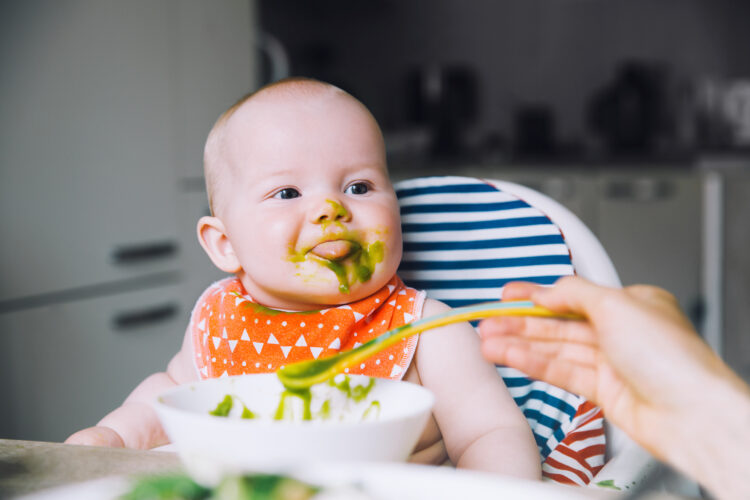Are you thinking about introducing solid foods? You may have given a lot of thought as to what and how to feed your baby during this important transition in their feeding experience.
As parents, we are constantly thinking about how our choices and behaviors will shape our children – and for good reason! But we might be less likely to think about how our children’s reactions and behaviors may shape us as parents. The potential impact babies have on their mothers during early solid food feeding was illustrated in a recent study. Read on to learn more!

How your baby may influence you when introducing solid foods
Within the Baby’s First Bites study, 246 first-time moms and their babies were observed while introducing solid foods. The researchers asked moms to offer their babies cauliflower on one day and green beans on the other. They then analyzed videos of these observations to identify when moms were responsive to their babies’ feeding cues, acted positively and warmly with their babies, and allowed their babies to decide how much to eat. The researchers also analyzed how much the babies ate. Finally, they asked moms how much they thought their babies liked the veggies.
A key finding was when moms were more sensitive and positive, their babies ate more vegetables. More sensitive and positive moms also thought their babies liked the vegetables more. However, further analyses showed that how much babies liked the vegetables on the first day predicted how sensitive moms were on the second day – and not the other way around! This suggests that moms’ behaviors did not affect how much their babies ate or liked the vegetables. Instead, when babies showed more liking for a new food, their moms reacted more sensitively and positively at the next meal.
What do these findings mean for you when introducing solids?
Sensitive feeding – also known as responsive feeding – is the recommended way to feed babies. We know that recognizing and responding to babies’ cues is an important way to create warm and positive mealtimes. Responsive feeding also ensures we are meeting babies’ needs. Parents should still adopt this feeding style but know that they might be influenced by their babies’ behaviors and reactions to foods.
It may be harder to be sensitive and responsive if you have a baby who is fussier or less adventurous when trying new foods. Therefore, your challenge is to understand how you might be reacting to your baby. If you have a baby that is less willing to try new foods, reframe their behaviors in ways that allow you to still achieve responsive feeding. For example: “My baby needs more time and support to learn to like this food and that’s okay. Every baby is different!” As you feed your baby, notice what reactions you have to your baby’s responses to new and familiar foods. Your reflections might surprise you, but they don’t have to guide you!
Want to know more about how to shape your baby’s food preferences in preparation for introducing solid foods? Learn more here.
Enjoying Developing Appetites? Subscribe here to have new posts delivered straight to your email!

